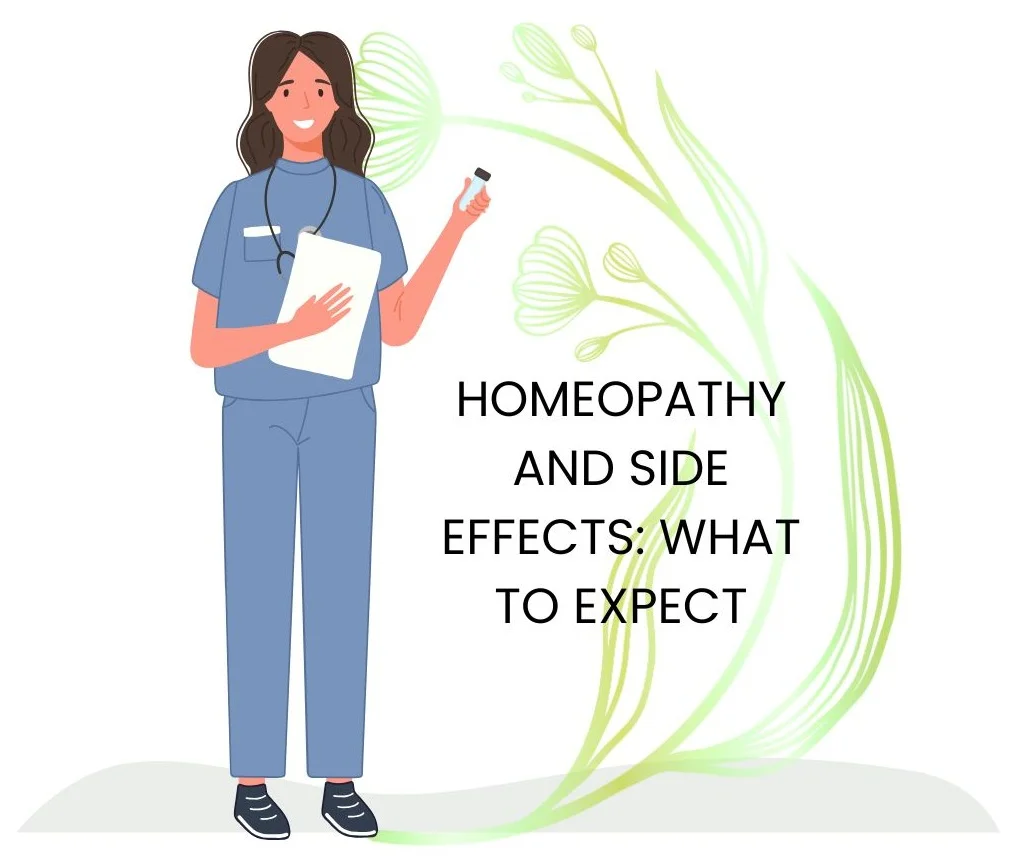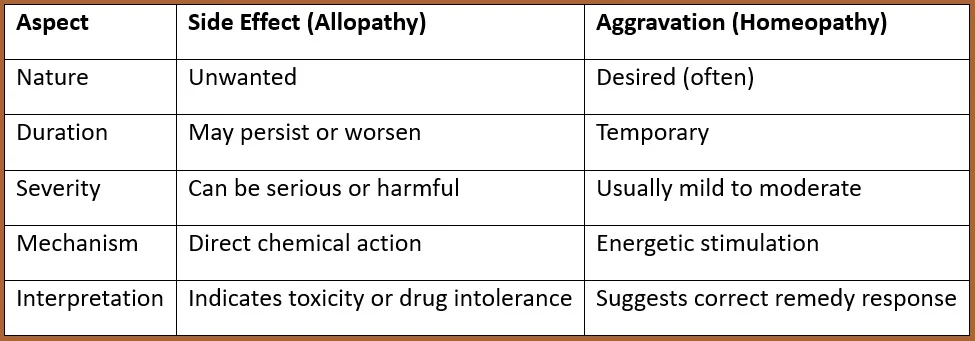Homeopathy is widely celebrated for being gentle, natural, and free from chemical-based toxicity. Yet many first-time patients — and even new practitioners — ask the same important question:
“Are there side effects in homeopathy?”
This blog dives deep into what you might actually experience during and after homeopathic treatment. We’ll explore:
- What the term “side effects” means in homeopathy
- Homeopathic aggravations
- What’s normal, what’s not
- Why classical homeopaths view symptoms differently
- Real-world advice for both patients and practitioners

Table of Contents
ToggleWhat Are Side Effects?
In conventional (allopathic) medicine, side effects are unintended reactions to a drug — often harmful — caused by the chemical itself.
In contrast, homeopathic remedies are made through serial dilution and succussion, leaving behind no measurable molecules, only energetic imprints.
Therefore, traditional drug-like side effects (like liver damage, drowsiness, or stomach ulcers) don’t occur.
But that doesn’t mean there are no reactions at all.
Homeopathic Aggravation: A Unique Concept
Homeopathy has its own version of reaction called “homeopathic aggravation.”
What is it?
A temporary intensification of your existing symptoms after taking the correct remedy — typically for a few hours to a few days.
Why does it happen?
Because the body is responding. The vital force is stirring, trying to restore balance. It often indicates that the remedy is correct and is working.
“Aggravation is not side effect. It’s a response. A sign the system is waking up.” — Dr. Samuel Hahnemann
Example:
A person with chronic eczema takes a remedy and experiences a slight flare-up in itching or redness for 2–3 days, followed by a deeper, long-lasting improvement.
Difference Between Side Effects and Aggravation

What to Expect After a Homeopathic Remedy
Here’s a basic idea of what reactions can occur:
Nothing Happens Immediately
- Not every remedy acts fast.
- Some work subtly or need more time, especially in chronic cases.
- Give it time — your body may respond over days or even weeks.
Temporary Symptom Shift or Flare
- Slight worsening of existing symptoms.
- Often seen as a sign the remedy is resonating.
Return of Old Symptoms
- Known as ROOS (Return of Old Symptoms).
- Indicates a reversal in the disease process — the body retracing its steps to healing.
Emotional Release
- Patients may feel unusually emotional, cry without reason, or feel mentally lighter.
- The mind often heals alongside the body.
Increased Energy or Sleepiness
- Many patients report improved sleep, vivid dreams, or feeling more energetic.
- Some feel tired initially — it’s the body repairing from within.
When It’s NOT Normal — Signs to Recheck the Remedy
Although homeopathy is safe, here are red flags that may indicate an incorrect remedy or repetition:
- New symptoms arise that were never present before
- Old symptoms persist without relief
- Aggravation is prolonged (more than 5–7 days) and worsening
- Mental symptoms deteriorate (severe anxiety, depression, etc.)
If any of these occur — consult your homeopath. Do not self-repeat or change remedies randomly.
The Role of Potency in Side Effects or Reactions
Low Potencies (6C, 12C, 30C)
- Gentler action
- Safer for self-prescription (acute conditions)
- Less chance of aggravation
Medium to High Potencies (200C, 1M, 10M)
- Deeper action on mind and emotions
- Best under professional supervision
- More chance of aggravation or emotional shift
Can Homeopathy Cause Long-Term Harm?
No, if used appropriately.
Homeopathy doesn’t suppress the body’s functions or harm organs. However, misuse — like:
- Repeated wrong remedies
- Over-repetition
- Polypharmacy (too many remedies at once)
… can confuse the vital force and delay healing.
This is why classical homeopathy recommends:
- Single remedy
- Minimum dose
- Proper case analysis
- Regular follow-up
Who Should Be Extra Cautious?
While homeopathy is safe for all ages, extra care should be taken in:
- Pregnant women — avoid frequent repetition unless advised
- Infants & toddlers — use low potency unless supervised
- Elderly with multiple medications — remedy may interact energetically with strong allopathic drugs
Always work with a qualified homeopath when treating complex or chronic issues.
Tips for Patients to Stay Safe
- Never self-medicate chronic diseases. Consult a qualified practitioner.
- Track changes after the remedy. Write down physical, emotional, and dream changes.
- Report any discomfort or confusion to your doctor.
- Avoid coffee, camphor, menthol, or strong aromas — they may antidote the remedy.
Advice for Beginner Practitioners
- Start with low potencies until you understand the patient well.
- Explain aggravations to patients — they often panic without education.
- Always take a complete follow-up. Many good remedies are wrongly judged failures.
- Be cautious of placebo effect — some changes may not be due to remedy at all. Watch patterns.
Final Words: Trust the Healing Process
Homeopathy works with the body, not against it. If you understand the difference between a side effect and a healing response, you’ll be more empowered in your healing journey.
“The highest ideal of cure is the rapid, gentle, and permanent restoration of health.” — Hahnemann
Gentle doesn’t mean inactive. Subtle doesn’t mean slow. Homeopathy heals from the inside out, and sometimes, that healing comes with temporary discomfort.
Be patient. Be observant. Be supported by a skilled homeopath.
If you found this helpful, feel free to share with someone curious about homeopathy!
And if you’ve experienced any kind of reaction to a remedy — good or bad — tell us in the comments. Let’s learn together.
